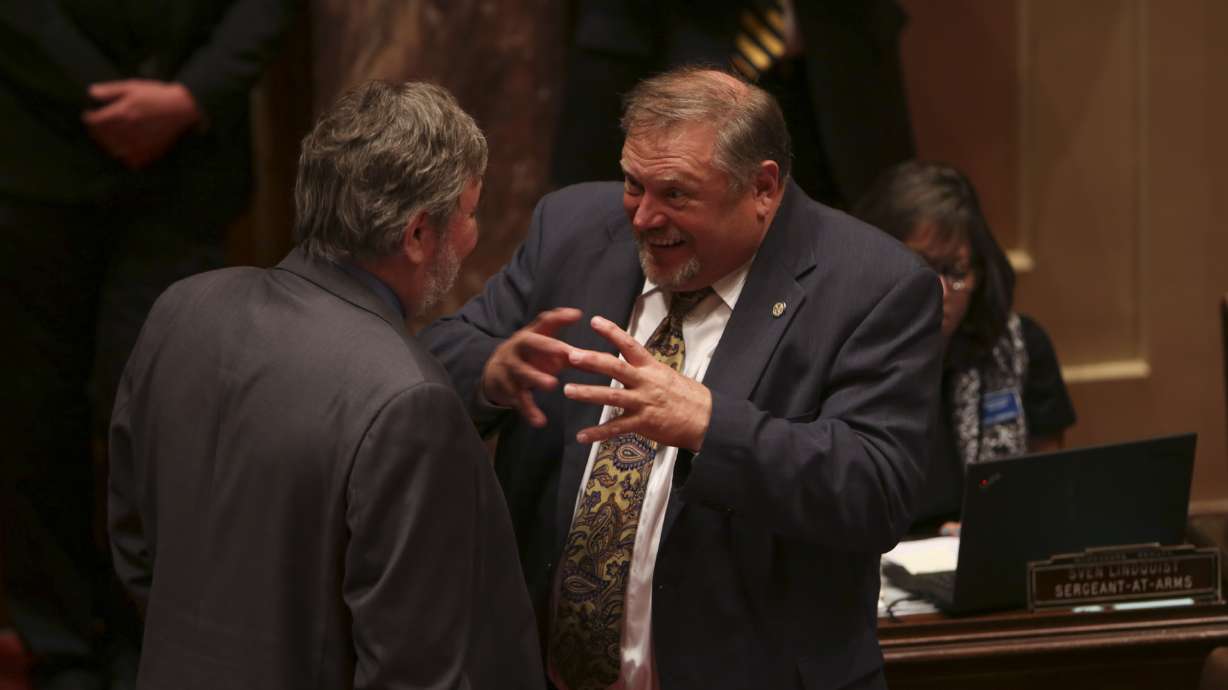Estimated read time: 4-5 minutes
This archived news story is available only for your personal, non-commercial use. Information in the story may be outdated or superseded by additional information. Reading or replaying the story in its archived form does not constitute a republication of the story.
ST. PAUL, Minn. (AP) — Minnesota's Legislature careened toward a likely special session amid a budget standoff with Gov. Mark Dayton, though the when and where of that overtime period was up in the air.
In the final hours Monday of their five-month regular session, lawmakers confronted the last pieces of a nearly $42 billion budget and faced the possibility of one or more Dayton vetoes. The next budget must be in place by July 1 to avoid a partial government shutdown, an almost unthinkable outcome given a nearly $1.9 billion projected surplus and promises that split-power government wouldn't mean a return to gridlock.
Democratic Senate Majority Leader Tom Bakk predicted it could take weeks to mend a rift over education and enable the Legislature to return for a brief special session. He was preparing to retreat to a cabin with his sons and grandkids in what has become an annual end-of-session family tradition
"People need to go home and recharge and let some of the emotion out and come back," he said.
Lawmakers gave final consent to a $17 billion plan for public schools, which Dayton has vowed to veto because it excludes money for his prized preschool initiative. A plan for agricultural and environmental programs also consumed hours of debate. Bills with basic funding for transportation and operations of state government won approval.
Legislators have worked around the clock the last few days to finalize provisions sweet and sour to the governor. The budget would boost funding to rural nursing homes but also increase health care premiums for more than 90,000 working poor residents on a subsidized health care program. Even the regulatory changes that Dayton dislikes are paired with additional funding for farmers affected by a deadly bird flu outbreak and a requirement for farmers to install buffer zones along waterways for cleaner water.
The two chambers gave final approval to the budget just before midnight and then adjourned.
Thought the biggest barrier to a timely finish was Dayton's looming veto of the education budget bill, it wasn't the only potential casualty. Dayton has said little about his plans for other sections. Lawmakers guessed that if a special session was inevitable, other vetoes could follow.
State Auditor Rebecca Otto said Dayton should take down a state agency funding bill because of language that would give counties more room to contract with private companies for financial audits her office does. She said it would weaken oversight, even as supporters said it would reduce costs. Dayton has to weigh whether to put funding for key agencies at risk of shutdown and raises for state workers to preserve Otto's auditing muscle.
"He was a state auditor," Otto said of Dayton's first political office. "I don't know he would let it go on his watch."
The governor's plan to have the state foot the bill for half-day classes for all 4-year-olds got left out of an education bill that otherwise boosts payments to schools by $400 million. Bakk said he supports the preschool initiative but couldn't get his GOP counterparts to pay for it. He said it's up to Dayton to find a compromise with House Speaker Kurt Daudt, whose Republican caucus has shown little interest in establishing a statewide program.
"I told him I'm not going to spend my whole summer in St. Paul," Bakk said.
Daudt showed no signs of cracking under the threat of a special session. Before the House passed its own education bill early Monday morning, he said Dayton should try to keep drumming up support for preschool and try again next year.
"It's not my obligation or responsibility to earn support for the governor's No. 1 priority," the speaker said.
Where they would hold the potential special session was unclear. Only Dayton has the power to call them back.
The House and Senate chambers will be off-limits beginning Tuesday because of a major Capitol renovation project. Dayton floated the idea of pitching a tent on the front lawn rather than renting space, a suggestion Bakk dismissed as unlikely. A downtown St. Paul hotel offered Monday to play host to a special session free of charge.
Meanwhile, another Dayton priority fell into place.
Lawmakers made late changes to a plan toughening rules for vegetation buffer zones separating farmland and public waterways in an effort to prevent chemical runoff. The revised plan calls for buffers of at least 30 feet in width but an average of 50 feet along public waters. The strips could be narrower along drainage ditches. Compliance deadlines would be late 2017 for public waters and 2018 for ditches. Farmers who don't comply could face fines and orders for corrective action.
Rich Bischke of The Nature Conservancy in Minnesota called it "the most significant advancement in Minnesota water policy since 1991" and one that would improve water quality for wildlife.
Copyright © The Associated Press. All rights reserved. This material may not be published, broadcast, rewritten or redistributed.








